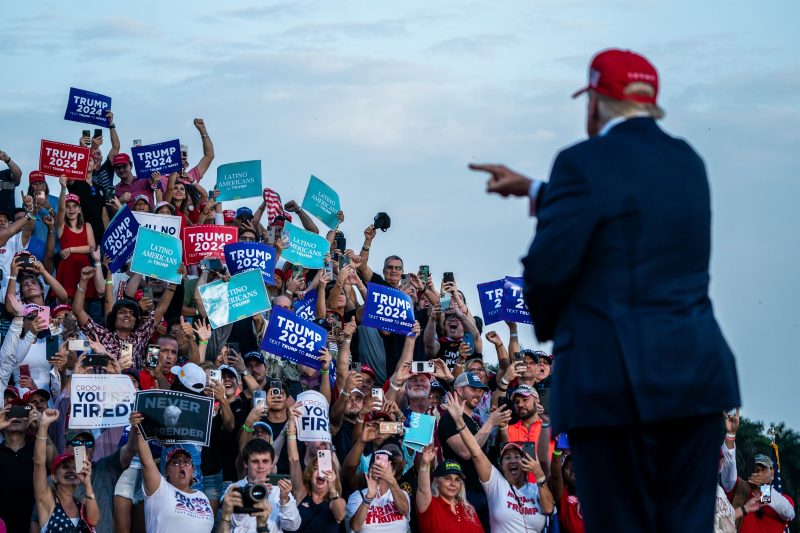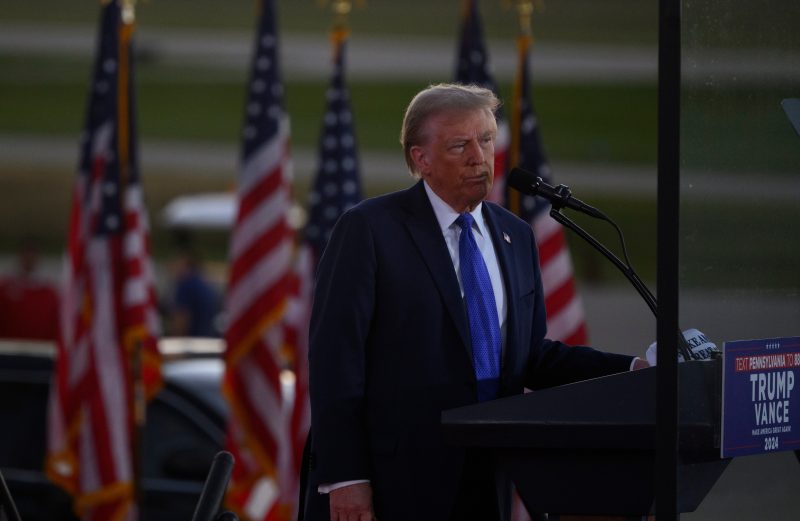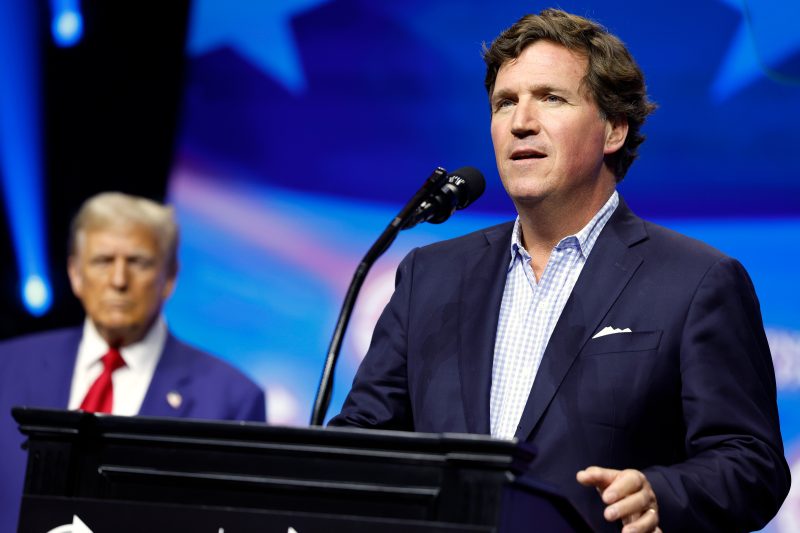
Wealthy industry donors fuel Trump’s conversion on cryptocurrency
Donald Trump deemed cryptocurrency “a scam” and a “disaster waiting to happen” during his term in office.
In the official Republican Party platform that Trump edited last week, he struck a different tone.
“Republicans will end Democrats’ unlawful and un-American crypto crackdown and oppose the creation of a Central Bank Digital Currency,” reads the platform, which will be formally adopted Monday at the Republican National Convention in Milwaukee. “We will defend the right to mine Bitcoin, and ensure every American has the right to self-custody of their digital assets and transact free from government surveillance and control.”
The about-face comes after an aggressive campaign by wealthy cryptocurrency executives, who have lavished Trump’s campaign with donations, spent money at Mar-a-Lago to hold events, promised to hold fundraisers for his 2024 campaign and lobbied him with sharp criticisms of President Biden and his administration, according to eight people familiar with the matter, who spoke on the condition of anonymity to describe private conversations and fundraisers.
While seeking big checks from some of the country’s wealthiest Republicans, Trump has often promised donors at fundraisers to enact policies they would like — from cutting their corporate taxes to approving their oil permits to throwing pro-Palestinian demonstrators out of the country.
In recent months, Trump advisers say the former president has held numerous meetings about cryptocurrency with donors and prospective donors. His interest was piqued on cryptocurrency — a digital currency not tied to any central bank — when a group of donors came to Mar-a-Lago and said they would support his campaign and complained about Biden administration officials, including SEC Chairman Gary Gensler.
Trump recently attended another large fundraiser in California that was stacked with cryptocurrency executives, according to people who attended. Trump vowed to support their “innovation,” according to an attendee.
Trump and his campaign have met repeatedly with David Bailey, a cryptocurrency entrepreneur, who has promised to hold Trump a $15 million fundraiser in Nashville later this month, according to people familiar with the matter. Trump is also expected to headline a cryptocurrency conference there, where he was sold on the idea of a large crowd and celebrities.
One of the private meetings Bailey had with Trump was in New York at Trump Tower this past spring during the former president’s criminal trial on business fraud charges, according to people with knowledge of the meeting.
His campaign announced they would take donations through cryptocurrency days after that meeting. Cryptocurrency executives and supporters have also held multiple events at his Florida club, according to people who have attended.
Over a dinner last month, Bailey also pitched Trump senior adviser Vince Haley on a number of cryptocurrency ideas, the people said, the same meeting where he pitched the fundraiser in Tennessee.
Haley then drafted the platform that had the supportive language about cryptocurrency, the people said. It was a topic the party had never touched in the past and surprised some longtime party members, who wondered where the language came from. It passed overwhelmingly in Milwaukee last week and received little scrutiny.
A Trump spokesman declined to answer questions about the donors supporting Trump’s push and his reversal on cryptocurrency.
“Crypto innovators and others in the technology sector are under attack from Biden and Democrats,” said Trump campaign spokesman Brian Hughes. “While Biden stifles innovation with more regulation and higher taxes, President Trump is ready to encourage American leadership in this and other emerging technologies.”
Advisers said Trump knew very little about cryptocurrency until the donors approached him — and had long held negative feelings about it, viewing it as fake money.
“I am not a fan of Bitcoin and other Cryptocurrencies, which are not money, and whose value is highly volatile and based on thin air,” he wrote on Twitter in 2019. “Unregulated Crypto Assets can facilitate unlawful behavior, including drug trade and other illegal activity.”
A senior Trump 2020 campaign adviser said there were never discussions about focusing on cryptocurrency in the campaign or including it in the party’s official platform because Trump was so opposed.
“He thought it was … weird and he wanted nothing to do with it,” the official said. “He had no clue what it was and wasn’t interested in learning.”
A second adviser who spent hundreds of hours with Trump said, “I only talked about it with him once or twice, and he wasn’t a fan.”
Two donors described talking to Trump privately when he promised to be helpful on the issue, but he did not seem to know the intricacies of cryptocurrency. Trump’s thinking, according to people who have spoken to him, is that there are cryptocurrency supporters who can help him win back the presidency, and there are potential donors to his campaign who like the currency and want to use it.
“Trump understands that the Biden administration has mishandled crypto policy and misjudged its significance,” said Trump donor and cryptocurrency executive Kyle Samani, who attended the California fundraiser. “A lot of crypto people are single-issue voters, have money and are looking for a candidate to support. He and his team recognize all of the above and are capitalizing on it.”
Samani, Bailey and other donors said the industry was frustrated by the Biden administration’s regulatory actions. Others in the industry, including some who dislike Trump, said Gensler had been particularly aggressive and that they needed to come up with reasonable regulations for a largely unregulated industry.
The SEC has filed more than 80 cases against figures in the cryptocurrency industry during the Biden administration, according to the agency’s website. The charges have often included defrauding customers, misrepresenting assets or conducting unregistered offerings of cryptocurrency.
“The SEC’s Office of Investor Education and Advocacy continues to urge investors to be cautious if considering an investment involving crypto asset securities,” the agency warns on its website. “Investments in crypto asset securities can be exceptionally volatile and speculative, and the platforms where investors buy, sell, borrow, or lend these securities may lack important protections for investors.”
A spokeswoman for Gensler declined to comment on the administration’s regulatory actions. A Biden campaign spokesman, Ammar Moussa, declined to comment. In recent days, top White House officials have met with cryptocurrency executives, where they heard a range of complaints.
Tim O’Brien, a longtime biographer of Trump, said Trump’s embrace of cryptocurrency was not surprising.
“Anyone who has ever walked into Trump’s office and offered him an easy way to make some money, they get his attention. They are off to the races,” O’Brien said. “He’s always been opportunistic about policy.”
The industry has jumped at the chance to shape Trump’s thinking. In recent years, cryptocurrency executives have flooded Washington with contributions, according to OpenSecrets, a group that tracks campaign contributions. The industry is responsible for about $121 million in contributions so far this election cycle, according to the group.
According to an analysis provided by the group, more contributions have gone to Republicans than Democrats during this cycle. That is the first time Republicans have taken the financial advantage in donations from the industry, data from the group shows.
Earlier this year in the hills of San Francisco, multiple cryptocurrency executives attended a fundraiser at the home of donor David Sacks, according to an attendee sheet reviewed by The Washington Post. Cameron Winklevoss and his twin brother Tyler — famed cryptocurrency investors — both maxed out in donations to the Trump campaign, a campaign official said.
Multiple questions were asked about cryptocurrency at the fundraiser, and Trump gave supportive though not substantive answers, attendees said. He also voiced support for cryptocurrency in his opening prepared remarks.
“It was probably 20 percent of the fundraiser,” one attendee said.
The donors have been pleased with their access to Trump’s inner circle.
“We’re really excited about what the Trump campaign has done publicly. We’re excited to see what they do in the future,” Bailey said.
Greg Xethalis, a lawyer for the cryptocurrency firm Multicoin Capital, said he was happy the party platform had included such supportive language. Xethalis said he never expected his firm to be involved so much politically.
“It’s pretty strong and good language. It sets the right general policy objectives and can be followed with creating good, consistent legislative and regulatory frameworks,” Xethalis said. “Crypto has become more of a political issue than we necessarily would have thought … The Republican Party has seen an opportunity here.”
Ashley Parker and Yvonne Wingett-Sanchez contributed to this report.



